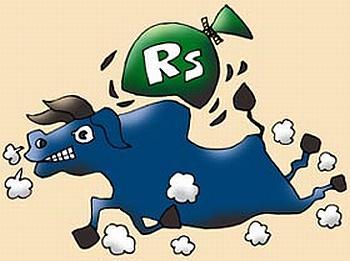Photographs: Rediff Archives Dhanashri Rane, Fundsupermart.com
At the end of a season, most retailers offer discounts and announce a 'flat sale offer' to attract buyers to the stores. It is easy for us to estimate the deal that we are getting while buying the goods from the store.
In stock markets, the Price/Earnings Ratio indicates whether the equity markets are trading at cheap, fair or overpriced levels from their historical levels.
While the decision to buy depends on availability of surplus, product features and financial goals and can be made easily after much introspection, investors are often confused and ask us: When should I sell? This is often a difficult decision to make. What if you sold and the price went up further? What if you didn't sell and the price fell?
Click NEXT to read about the 5 GOLDEN rules
Disclaimer: This article is for information purpose only. This article and information do not constitute a distribution, an endorsement, an investment advice, an offer to buy or sell or the solicitation of an offer to buy or sell any securities/schemes or any other financial products /investment products mentioned in this article or an attempt to influence the opinion or behavior of the investors /recipients.
Any use of the information /any investment and investment related decisions of the investors/recipients are at their sole discretion and risk. Any advice herein is made on a general basis and does not take into account the specific investment objectives of the specific person or group of persons. Opinions expressed herein are subject to change without notice.

When to sell a mutual fund? 5 GOLDEN rules
We have created simple rules of thumb for you to follow:
1. Pre-determining your goal
For every mutual fund that you buy, set yourself a goal for the kind of returns that you want to see on it and the time frame.
Say, you decide on 15 per cent for one year. If you reach this target within a year, do a review. Is there more room for growth? If you think so, set another goal. Maybe you'll up the original 15 per cent to 20 per cent. But if you think that the upside is limited, then you may want to book profit and re-invest into another investment opportunity.
Setting a goal allows you to be focused and disciplined. If you go with a 'see-how-it-goes' attitude it is harder to plan for specific returns.
Sometimes after you sell, the mutual fund may appreciate even more. You have to learn to 'let that go' emotionally!
Tell yourself that you have already made your intended returns, and that at the point of selling your diligent research pointed towards selling.
That's the best you can do. There is absolutely no scientific way of knowing that the mutual fund will appreciate further. Thus, one can set target returns on a fund as per your financial goals in order to achieve desired results.
When to sell a mutual fund? 5 GOLDEN rules
2. When a fund continually underperforms its peers
Sometimes you may see your mutual fund depreciate in value and you feel disheartened. You have to ask yourself these questions:
- Is the fund manager still amongst the best in the sector?
- Is the long-term future of the sector good?
If you have a long-term investment horizon, and the answer to both the above questions is yes, you might want to sit tight and do nothing. Volatility in the market is to be expected.
However, if you start to doubt that your fund manager is doing his job, and discover that the fund is consistently performing poorer than other similar funds even after a period of three to five years, then it might be time to re-examine your holdings. You might want to take your losses, sell out and switch to another fund.When to sell a mutual fund? 5 GOLDEN rules
3. When the fund doesn't do what you thought it would
Certain funds give their fund managers tremendous latitude in allocating the funds across sectors and asset classes. You might have bought into a fund because of its current strategy. However, as its strategy changes over time, you might find that it doesn't fit with your investment goals any more.
You might want to move your investments elsewhere.
When to sell a mutual fund? 5 GOLDEN rules
4. When your risk profile is skewed
Rebalancing ensures the risk-reward ratio in your portfolio is maintained and helps protect the downside as well as take advantage of the market situation.
If you have a short-term investment goal, you might want to sell in the event of a major change in that sector that you have invested in. For example, natural disasters like earthquakes, or political changes, could cause previously promising sectors to lapse into bad situations for a very long time. If you have the time, you might ride it out. But if you don't, it might be better to shift your investment focus.
The actual market performance and variation in returns may also affect the share of fixed income and equity in your portfolio. Greater the variability you are willing to accept; more can be the deviation in the portfolio allocation. But remember, when market tumbles, the value of equity component may reduce drastically.
For example, when you are approaching retirement or planning to take a break from work, you would need more cash than while in employment. You can therefore sell your equity holdings and shift funds into an income generating fixed income product.
When to sell a mutual fund? 5 GOLDEN rules
5. What NOT to do
Do not stay with a fund blindly. This is your money and so you should keep an eye on it. You would want to be sure that the fund is staying its course, that its fund managers are still the best in town, and that the sectors which you have invested have a good future.
There are many mutual fund companies which have fallen by the wayside. You don't want to have money with those. They might have been very promising companies for several years, but through mismanagement or key personnel's departure, their results suffered and never recovered.
It might be painful to take losses. And you might think that if you do not sell, then your loss is only 'paper loss' and not real. If you have invested with a bad fund manager, the losses are very real, and not selling it now simply means that you would have to take an even greater loss in the future.






Comment
article